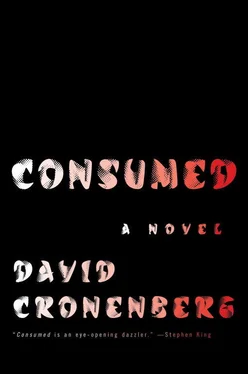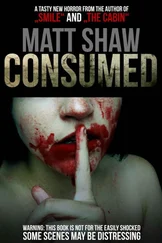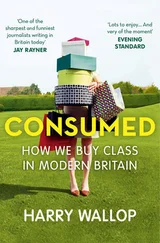She wasn’t sure she was ever serious about giving her Nikon gear to Nathan and riding off into the sunset with only her BlackBerry and her iPhone and her iPad and her laptop as image-making devices—was there anything now that did not take pictures and video?—and when it came to rolling out the door of their room at Schiphol, she didn’t hesitate to take it with her. She would not feel like a pro without the Nikon gear. And she would not have been able to do what she was doing now: placing two wireless Speedlight flash units—diffusers for softer lighting clipped over the flash heads—on a chair and a dresser, then the camera on a tripod next to the laptop, then setting the timer, then beginning to take portraits of herself artfully lit by the flashes and the soft window light.
Later, back on the bed, sorting through the shots with Photo Mechanic, her favorite fast photo browser, she began to settle on a few that presented her as beautiful but moody, intelligent and intense. She laughed at her topless variants, but she couldn’t quite bring herself to delete them; the light on her breasts was so soft and voluptuous, they might never look that good again, though what was that mole doing on the left underside? Was it bigger than the last time she looked? Was it redder? Pinker? Less symmetrical? She zoomed in on the mole, put a window around it large enough to encompass the slighter paler circle that surrounded it, dated the window, and saved it as a TIFF to her “Body Horror” file, the one that stored images of every scary part of her body, the iffy, unstable, volatile parts. Now kill the ADHD. Focus. Back to that email.
“Dear M. Aristide Arosteguy, I’m writing you this email and attaching several photos of myself that I’ve just taken with the very object you discuss in your wonderful and inspiring online essay ‘The Anatomy of a Perfect Object.’ My purpose is simple, though the results might well be complex: I want to fly to wherever you are and interview and photograph you.”
Naomi reread her email a few more times, leaning forward on the bed to add to it, finesse, backtrack, elaborate. The Arosteguy essay concerned consumer objects and the possibility of beauty that could equal or exceed natural beauty, given the industrial/technological new state of man. Natural beauty became atavistic, nostalgic. Real objects of the innate lust for beauty were now commodities, industrial products. She was not sure that photos of herself posed with some of her nest objects really said anything at all about the anatomy of a perfect object, but she was confident enough in her own beauty to feel that Arosteguy, who was, after all, both French and Greek, would want to meet her in Tokyo. She added two of the best topless photos to the “attached” list and hit Send.
NATHAN STOOD IN FRONT of what Naomi had mocked as a faux chateau in the heart of Toronto’s Forest Hill. A quick swivel to right and left confirmed what Nathan had seen from the taxi. Roiphe’s castle was not alone; the street was aswarm with synthetic stone facing, copper-trimmed turrets, and authentic-looking slate roofs, though it had to be said that a kind of neo-Victorian mausoleum variant was also well represented. Nathan shouldered his tripod case and pulled his reluctant camera roller up the cobblestoned pathway to the front door. The stone porch was shaded by a fan-shaped, art-nouveauish tinted glass canopy. The front door was huge, exotic wood and pebbled glass. Nathan was searching for a doorbell button when the door opened with a vacuum-lock whoosh. A beautiful willowy woman wearing a disturbingly clinical white cotton dress with long sleeves and a high collar stood in the doorway. She seemed to be about thirty.
“Hi,” said Nathan. “I’m Nathan Math.” The woman just looked at him, no affect whatsoever. An awkward pause. “I, uh, I have an appointment with Dr. Roiphe.” No reaction. “An appointment with the doctor?”
Her eyes were so large that they narrowed suspiciously without seeming to get smaller. “You don’t have an appointment with the doctor.”
“I don’t?”
“The doctor doesn’t take new patients. You are new. You would be a new patient.”
“Oh, right, no,” said Nathan, exhaling in slightly exaggerated self-directed mirth. The woman had rattled him without actually doing anything. “I’m not a patient. I’m a journalist. I write on medical/social issues. I’m interviewing him. Dr. Roiphe. About his career.”
“What’s wrong with me?” she said, brushing her blond hair back, her voice unaccountably hard.
“What?”
“Diagnose me. You do have some medical training, don’t you? How could you write meaningfully about the doctor if you had no medical training?”
“Some medical training. Some. Is there something wrong with you?”
“Well, yes, of course. I wouldn’t be a patient if there weren’t something wrong with me.”
“You’re a patient? Of Dr. Roiphe?”
It seemed to Nathan that the woman was on the verge of slamming the door in his face, and he was calculating his response to that when a crusty voice reverberated from deep within the house. Nathan could practically hear all of the house’s marble floors in the acoustics of that bellow. “Chase?” called Dr. Roiphe. “Is that our own private paparazzo? Bring him on in!”
“Welcome, Mr. Math. Please, do come right in,” said Chase, suddenly genial. She swung the door open wide and curtsied an ironic curtsy as he sidled by her, his tripod case thumping the door frame, his roller bumping and twisting over the raised granite sill. She bent towards him and whispered, “Consumption. That would be my guess.”
Her face was uncomfortably close to his. “Consumption? You mean tuberculosis?”
Still whispering, still too close. “No. I mean consumption.” She straightened up, smiled, and said, “Follow me!” in quite a different tone, too loud and too declamatory, then turned and marched off into the house leaving Nathan struggling to follow her. Center-hall plan, polished wood staircase, black-and-white-streaked marble floors everywhere. Chase veered off to the right and stood just inside the living room, waiting with exaggerated patience for Nathan to pull his roller up to her. The room was furnished in a very traditional way, as befitted a Victorian fantasy of a French chateau, and this was yet another level of fakery because it looked as though the house had been bought complete with the real-estate agent’s staging furniture and never touched again. She gestured to a plump brocaded wingback chair. “That’s where you’ll be.”
“And where will you be?” said Nathan, fussing the tripod case off his shoulder, trying not to swipe the pottery animals off the side table by the sofa, which matched his assigned chair.
“I’ll be in limbo, Nathan. Come see me there when you have the will.”
By the time Nathan could lift his eyes from the gear he’d just settled on the floor, Chase was gone, leaving him to imagine the set of her face, and to wonder whether she could possibly be coming on to him. As he sat in the indicated chair, he felt rather upbeat about the demeanor of this young woman, whose strangeness immediately suggested that he was on to something with this Roiphe thing, this Roiphe who was not as interesting as Parkinson.
Roiphe entered through a set of French doors which led onto a small flagstone patio. He turned and closed the doors, a bit shaky with the latches, and met the rising Nathan with an outstretched hand. They shook and sat down, Roiphe on the matching sofa.
“Nathan.”
“Dr. Roiphe.”
“Please, please call me Barry. I’ve always found it bizarre that the Americans call their ex-presidents ‘Mr. President’ for life. I am retired, you know.”
“Except for… Chase, was it?”
Читать дальше
Конец ознакомительного отрывка
Купить книгу







![David Jagusson - Fesselspiele mit Meister David [Hardcore BDSM]](/books/486693/david-jagusson-fesselspiele-mit-meister-david-har-thumb.webp)




